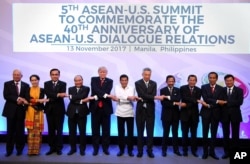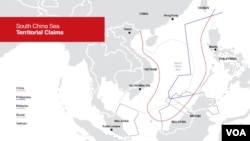A code of conduct aimed at avoiding mishaps in the contested South China Sea is likely to sidestep concerns that are offensive to the chief claimant, Beijing, analysts forecast.
China and 10 Southeast Asian Nations agreed at summits in Manila this month to start negotiations on a code of conduct for the resource-rich sea, where sovereignty is contested by six governments.
Beijing claims about 90 percent of the sea from its south coast to the island of Borneo. It has alarmed rival claimants, including Taiwan and four Southeast Asian states, since 2010 with its construction of artificial islands for fighter jets and radar systems.
Other claimants also value investment and development aid from the $11.2 trillion Chinese economy, making it harder for them to speak out.
“The discussion (on a code of conduct) should revolve around basically crisis prevention and crisis management,” said Jay Batongbacal, director of the Institute for Maritime Affairs and Law of the Sea at the University of the Philippines. “I don’t think it will be very specific.”
From goodwill to nonviolence
Leaders from Beijing and the Association of Southeast Asian Nations (ASEAN) agreed November 13 to open negotiations that will convert a framework code of conduct into a set of rules for the 3.5 million-square-kilometer sea.
The go-ahead followed more than a year of building goodwill between ASEAN and China, including pledges of Chinese aid for the Philippines plus a deepening of economic cooperation in Indochina. China in turn expects no challenge to its maritime sovereignty, analysts believe.
Code of conduct negotiators will assure the document “indeed doesn't have any implication on questions of sovereignty,” said Oh Ei Sun, international studies instructor at Singapore Nanyang University.
“So-called experts from various countries are really trying to look at it from various angles so as not to imply something disadvantageous toward them,” he said.
Claimants want the code to head off clashes among a million-plus fishing boats, coast guard vessels and naval ships that use the South China Sea. About one-third of the world’s marine shipping traffic passes through the same sea.
But Vietnam and China have sparred at least three times. Sailors died in naval clashes in 1974 and 1988. Beijing’s placement of an oil rig sparked boat ramming in 2014.
Rehash of older documents
The code will probably rehash milder parts of existing, non-binding agreements, said Collin Koh, maritime security research fellow at Nanyang Technological University in Singapore. “It’s not going to have any law enforcement power,” he added.
Among the older deals from which the code may borrow language is a China-Southeast Asia Declaration of Conduct signed in 2002, Koh said. The declaration calls for peaceful settlement of disputes, notification of military exercises and humane treatment of people in distress.
Parties may also borrow from the Code of Unplanned Encounters at Sea, a voluntary 2014 agreement followed by China and the United States, Oh said. China and the Southeast Asian bloc agreed last year to observe this code so they would improve what Beijing’s official Xinhua News Agency calls “operational safety of naval ships and naval aircraft in air and at sea.”
A third document they might consult is the U.N. Convention on the Law of the Sea, which covers rights of merchant ships, transit passage and “innocent” passage.
The code of conduct is expected further to enshrine use of a China-Southeast Asian nation hotline for foreign ministry use in case of maritime problems.
Code of conduct omissions
The code is likely to omit references to specific parts of the sea, especially occupied shoals, reefs and islets, analysts believe. It may also shun mentions to freedom of navigation or the use of outside dispute resolutions.
Beijing resents passage of U.S. ships through the sea and lost a world court arbitration to the Philippines in 2016 over the legal basis of its claims, which it backs with historical fishing records. Some countries worry China will declare an air defense identification zone over the sea to restrict foreign aviation.
China prefers to work things bilaterally instead through formal, international dispute resolution.
Today the maritime claimants normally protest diplomatically rather than with force over perceived sovereignty breaches. They also do not seize occupied islands from one another.
The code will probably consecrate today's reality in the South China Sea, said Alan Chong, associate professor at the S. Rajaratnam School of International Studies in Singapore. The relatively weak Southeast Asian states are unlikely to violate it, he said, putting the "onus" on China.
"The code of conduct, I think (is) de facto forcing China to recognize the existing boundaries," Chong said. "So China will play along as long as it leaves the door open for its ultimate claim of everything."
Signing by 2018
China and Southeast Asia agreed to open negotiations on the code of conduct early next year with an expected aim of signing it by the end of 2018.
China may want the code sooner than later to look like a good Asian neighbor, said Alexander Huang, strategic studies professor at Tamkang University in Taiwan. Without a glow from the code of conduct, Huang said, attention could shift to China's internationally controversial support for Communist ally North Korea, he said.
But China has more freedom to use the sea without a code, Koh said.
“In the first place, China will be always trying to play for time,” Koh said. “The longer it takes the more leeway China will have to do whatever it wants.”










